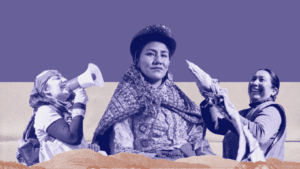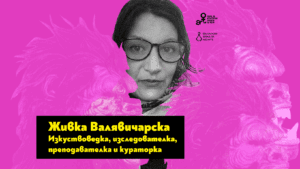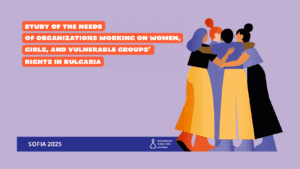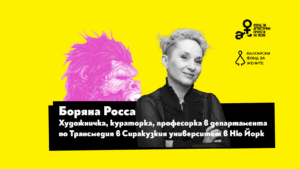107 creative projects by over 100 female artists and collectives from all over Bulgaria and abroad, 9 art projects supported with 30 000 BGN, an exhibition in 3 galleries in Sofia, over 100 media publications and appearances, nomination at the 63rd International Leipzig Festival for Documentary and Animated Film, as part of the program German Competition Short film for Veneta Androva’s AIVA, a residency at the Mutek Montreal AI Art Lab won by Albena Baeva, opening of the “Museum of the Woman – Alla Georgieva Collection” in partnership with the National Gallery.
These are some of the numbers we can use to describe the impact of the Fund for Art Projects by Female Artists, launched in 2017 with an aim to fight the insufficient representation of women in professional art and the cultural sector, to shed light on the work of female artists and to increase their access to financial resources.
This call would not have been possible without the financial support and trust of Power Pops, Takeaway, Mama Cash и Filia die Frauenstiftung, as well as by a number of individual donors.

In parallel with the establishment of the Fund for Art Projects by Female Artists, the BFW sent an inquiry to 10 public galleries in the country to see what is the ratio between women and men represented in their collections. We received responses from six institutions, which led to a unique study of the Bulgarian curator Dobromira Terpesheva “Where are the women in the whole picture of art?”. According to data provided by the National Art Gallery, 91% of its permanent exhibition consists of works by male artists, out of a total of 26,492 works in its collection, approximately 84% are by men and 16% by women, out of the 128 solo exhibitions organized since 1990, 111 are of men and only 17 of women artists, etc. The data obtained from Varna, Kyustendil, Targovishte, Sliven and Pazardzhik public galleries do not deviate much from the percentages stated above. Almost the entire visual history of our country turns out to be a dialogue in which the woman is silent. She is present in the works as a muse, as a mother, but she is rarely the protagonist in the visual narrative, the woman is simply the object of the gaze. At the same time, the members of the Union of Bulgarian Artists by 2018 are relatively equal, and among the new members admitted from 2007 to 2018, women even predominate – out of 706 new members, 365 are women and 341 men.

„ЕVERYTHING IS JUST FINE“
In an attempt to change the statistics in terms of representation and value of art created by women, in May 2019 BFW invited artists of all spheres of contemporary visual arts to propose projects for new artworks addressing “women’s topics” – from the place of women in the art system through their role (and expectations for it) in society and in private sphere, gender (in)equality in the labour market and decision making positions, motherhood, stereotypes of appearance, etc.
We called the initiative “Everything is just fine” to provoke an artistic reaction on issues related to the state of women’s rights and the actual situation of women: Are women in Bulgaria equal? Is there discrimination and inequality in society, art or within the family? Is activism needed or is feminism a closed page? Is everything just fine?
The received 107 concept proposals testified to the pressing need of women artists to take a clear stance and create socially engaged art. The jury selected nine projects presenting diverse perspectives on the role of women today in Bulgaria and in the world at large and dealing with topics such as artificial intelligence, the image of women in the Bulgarian cinema, the emotional, personal and social struggles of women, stereotypes related to family and role in society, and how they are reflected in different spheres of life and culture.
The diversity was not only in the interpretations, but also in the position from which the artists speak. The exhibition featured well-known Bulgarian artists whose feminism is highly represented, such as Boryana Rossa, Alla Georgieva and Albena Baeva. The selection also moved the geographical centre from Sofia to other cities in Bulgaria like Gabrovo (Nevena Ekimova) and Yambol (Pavlina Sarbova), as well as to other countries – Veneta Androva from Berlin and Daniela Takeva / Nikolina Nedelcheva from Dresden. Paolina Stoyanova and Marion Darova offered an artwork on the border between performance and film, while Darina Kokonova drew attention to the image of women, part of various social movements around the world.
All artworks were presented in an exhibition in three parts in three different locations in Sofia – Institute of Contemporary Art – Sofia, Credo Bonum Gallery and Doza Gallery. The originally planned period March 11 – April 3, 2020, coincided with the announcement of the emergency measures related to overcoming the crisis caused by COVID-19, and at the suggestion of the galleries themselves, their exposure was extended until May 31, 2020.
WOMEN ARTISTS IN FOCUS
Albena Baeva – Dangerous female beings, living in the depths, 2020 (a Stylegan trained on a mixed dataset, oil paint on canvas)
А woman standing in front of a wall holding an umbrella
A woman in a dress shirt and tie sitting on a bench
А woman sitting on a bench in front of a building
А woman holding a black umbrella on a street
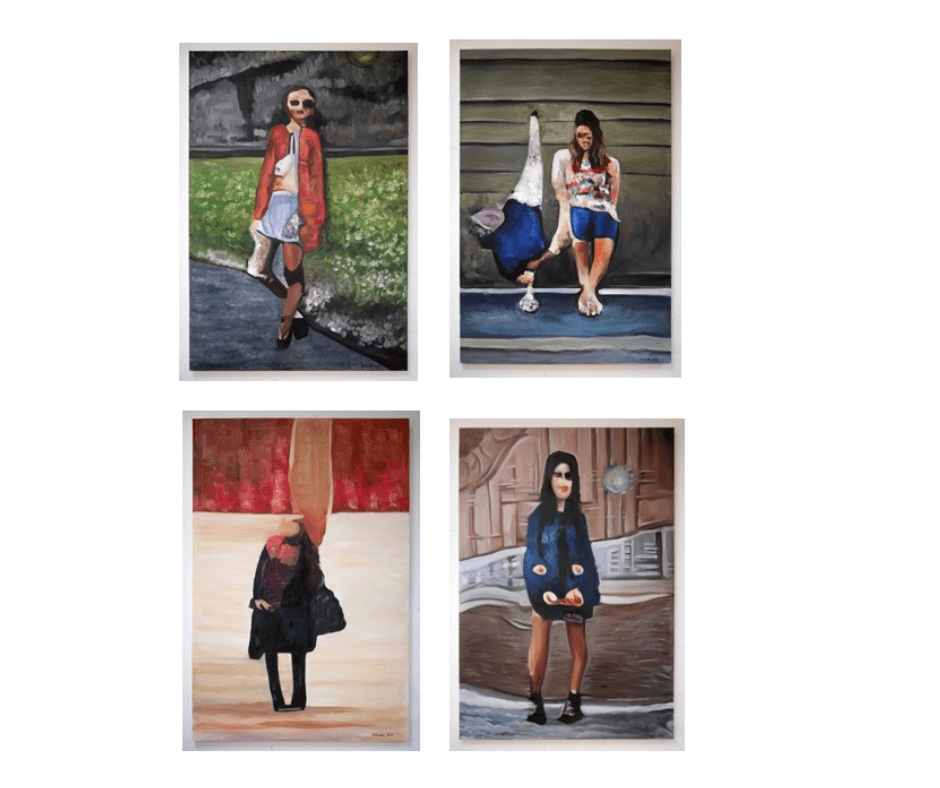
Portrait, human figure, woman in urban environment – it is difficult to describe the images that confront us in Dangerous female beings living in the depths. Albena Baeva trains Stylegan’s generative neural network with a carefully crafted dataset of women and marine creatures. The goal is to teach the network to generate images that resemble the source material. Due to the lack of homogeneity in the starting dataset, the result contains inaccurate images. It is precisely the “wrong” result that is selected. The artist transfers the selected images onto canvas through oil, trying to imitate the material typical of digital reproduction. Another algorithm analyses the paintings thus created, tries to understand what is depicted on them and describes it in a short text. This wilful dialogue between machine and artist is the consequence and response of over 60,000 documented images downloaded from the Internet. The series of translations that the figures go through allows us to take a fresh look at the source material in search of the portrait of a woman today.
“The award gave me the time I needed to delve into my research on the role of artificial intelligence in cultural processes. As a result, I created new partnerships, new works and won a residency in Montreal, Canada at the Mutek Montreal AI Art Lab.”
Albena Baeva won a residency with another 14 international artists from 7 different countries at the Mutek Montreal AI Art Lab in Montreal, Canada. The laboratory was founded by Natalia Fuchs and explored the topic of the participation of artificial intelligence in art. Albena was selected on the basis of her work and research done for the “Everything is just fine” award. Subsequently, she was invited to participate in Gama_LAB XR, which took place in May 2020 in St. Petersburg and online.
Alla Georgieva – Museum of Woman – collection of Alla Georgieva, 1999 – in development
The private Museum of Woman was founded by Alla Georgieva in 1999. The collection has been assembled for 20 years and continues to be expanded with new exhibits. The museum stores artefacts that demonstrate attitudes towards women in society over time. The main focus of the Museum of Woman is the objectification of the female body in advertising, the souvenir industry, household items, dolls, toys, design and more. Among the exhibits of the museum are objects treating the woman as a sexual object ready for consumption, as well as samples of the advertising industry using the female body to sell various goods. The collection includes both objects which exist on the market and specially created for the Museum art objects.

“Many of my projects start with intuitive collecting. In 1999, I bought Greek ice cube trays in the form of naked female torsos. In fact, the objects themselves began to look for me – I saw them everywhere I went. So I began to buy them more consciously, to build my own collection… Gradually over the years I have gained quite interesting artefacts, started selecting them, arranging them by topics and planning to show them one day. The right moment came after the project won the competition of the Bulgarian Fund for Women.”

In the exhibition alongside the other projects funded in DOZA Gallery, Alla Georgieva presented a small appetizer of the Museum. The collection, which traces the construction and perception of the public image of a woman in Bulgaria over the last 20 years, was displayed in its entirety at the Vera Nedkova House Museum part of the National Gallery, where it was exhibited from June 3 to September 30, 2020. The Museum continues to look for its permanent home in Bulgaria to ask the question – Is everything just fine?
Veneta Androva – AIVA, 2020 (video, 3D animation, 13 min.)
Meet AIVA – the female humanoid artist. She is in her mid-thirties, young and beautiful. But not only that, she is also unbelievably creative. The cis-male constructed female Ai artist has the task to contribute to more diversity in the art world and to show a female perspective on things. AIVA is studying the male nude, getting ready for preliminary sketches for her next masterpiece. Exploring different postures in nude painting, she is examining masculinity in its diverse forms.
Using the format of a TV-report, the film introduces us to the female Ai artist AIVA. The viewer has the extraordinary opportunity to take a look inside her studio and to observe her working process. The report ends with the opening of AIVA’s solo exhibition, where her works are on display. She is surrounded by her gallerist and the engineer team that created her. The works of the first female Ai artist have all been sold, bringing in over 1.2 million dollars for her creator. What an incredible success?

The video work AIVA is based on the true story of Ai-Da, the first female robot artist, created by a gallerist and engineering team in England in 2019. Exploring the boundaries of creativity and whether it is possible through an algorithm, another project for artificial intelligence in female gender has been realized. Given the systematic unequal treatment of women in the arts and the historical myth of the male genius, cultivated for centuries in the Western world, the project AIVA raises the painful question about the woman genius in form of artificial intelligence, created by cis-male. The film focuses on the lack of a female perspective in the field of artificial intelligence today and what it leads to – a world in which algorithms, designed to serve human needs, are conceptualized in female gender. Be it Siri, Alexa, Cortana, Samantha or AIVA – they are all there, on your service.
“As a visual artist who works mainly with video and film, I am often forced to realize my projects without a budget. The fact that I had the chance to be selected with my project AIVA in the BFW competition for artistic projects of women gave me the opportunity to realize the project with a professional team. The entire production and post-production of the film would not have been possible at this level without the financial support of BFW, for which I am sincerely grateful!”
The film will have its official world premiere at the 63rd International Leipzig Festival for Documentary and Animated Film DOK Leipzig where it is part of the official selection in the German Competition Short Documentary and Animated Film category and has a nomination for Mephisto 97.6 Audience Award.
Boryana Rossa – DETOUR: Women in Bulgarian Cinema (Part 1), 2019-2020 (video installation, 30 min + 27 min)
What do Bulgarian women think about their cinematic emobodyments? Twelve women from different generations analyze eleven Bulgarian films made between 1960 and 2019. The first part of this artistic research was shown in the exhibition, along with interviews with Bulgarian filmmakers and critics, who talk about gender in their own works. The research-project is tracing the development of female film characters and the societal issues that they reflect or criticize. The role models that these films represent are also in focus. The conducted interviews are a document that records huge generational and political gaps. But this document has the potential to foster continuity between these different generations as well as the formation of new identities. Of course, the political and social problems reflected in the films have a lot in common, but have different historical and political contexts. The demonstration of these differences also helps to understand the regression observed in some areas of women’s emancipation in Bulgaria, such as the ripping-off of maternity and childhood care; harder to achieve professional realization and education; the emergence of sexual exploitation replacing the sexual emancipation of the 1960s; the development of patriarchal nationalism, as deepening of the patriarchal structures that survived under socialism. The presented interviews also highlight positive developments in other areas of female identity, such as broader conversation about sexual and gender identities, observed since the 1990s, which is also experiencing regression, especially in recent years.

“By means of art, I am trying to reveal the increasingly aggressive and reactionary creation of “new” images of the woman and the mother that serve conservative ideologies and are becoming increasingly popular today, finding political representation through nationalist and conservative parties involved in today’s government.”
The video was also streamed online on 3rd of April 2020 followed by an online discussion about the position of women in Bulgarian art and cinema, women’s cinema images, the work of the Bulgarian Fund for Women, gender inequalities and intersecting issues, different types of identities and socio-economic factors.
Darina Kokonovа – Everything is Fine – as Long as we Fight, 2019-2020
With strength – portrait of a girl and a woman from autonomous Cheran, region of Mexico, 2018 (red beets, red pepper, charcoal on a sheet, 125х200 cm)

With determination – portrait of a participant in the Chipko movement in India in the 1970s (turmeric, charcoal on a sheet, 140х110 cm)

With joy – portrait of a woman from the 2019 Sudan protests (turmeric, baking soda and charcoal on a sheet, 140х90 cm)

With rage – portrait of a woman from the 1988 protests of mothers with strollers in Ruse (spinach and charcoal on a sheet, 125х95 cm)
There is a need to find not only criticism, protest and irony, but also hope among the political messages in art. A need for visibility of the women champions, who are can be seen among the seas of angry and beautiful faces of various mass mobilizations in different parts of the world, at different moments in global history. We are used to seeing portraits and busts of famous male revolutionaries from our history, but few female figures are recognizable by society. Each portrait is accompanied by an original photo and a text describing the situation. It places “random” women in the larger context of collective struggles, and connects movements not only through the intersections of the struggles against sexism, racism, environmental destruction and poverty, but also connects women as sisters beyond time and boundaries.
„This series is my love letter to the women all over the world, who find the courage to fight for justice and understand that they cannot do it alone. Pictured are a small sample of the incredible movements of women all over the world, in spite of their constant, but invisible labour in the home and the family, in spite of gender-based violence, in spite of war and in spite of the destruction of nature, which they are a part of. All of us share this Earth and almost all of us are subject to the global economic and political order which puts private profits and constant economic growth above people, animals, nature and life itself. I am thankful to all who dare to believe that another world is possible – as long as we fight for it together.“
![]()
![]() Nevena Ekimova – Wooden Wedding, 2020 (wood, textile, pyrography, embroidery, dimensions variable)
Nevena Ekimova – Wooden Wedding, 2020 (wood, textile, pyrography, embroidery, dimensions variable)
The wooden wedding is the fifth anniversary of a couple’s wedding. The work offers a documentary take on the everyday life of a five-year-old Bulgarian family. What does their life look like now, what does everyday life look like? A look “behind the scenes” of a modern and educated, but not harmonious young family. Couples with and without children will recognize motives from the power dynamics between the genders in a relationship shaped by its time and place – Bulgaria between patriarchal tradition and feminism.

Daniela Takeva & Nikolina Nedjalkova- I Put A Spell On You, 2020 (video, performance and online series in 4 episodes, 05’58’’/07’37’’/07’26’’/06’21’’)
I Put a Spell On You is a digital video performance and a web series by the artists Daniela Takeva and Nikolina Nedjalkova. Like many millennial women they see a reclamation of female power in the witch and feminist identities. Both conjure and counter a tortuous history of misogyny and can be emblematic of women overcoming oppression. Honoring the witch as a feminist icon they chose Baba Yaga who is one of the most memorable and distinctive figures in Eastern European folklore. In these four episodes of a web series they perform the role of this supernatural being and take a specific look at Bulgarian mysticism. In these video performances, they reinterpret the witch and occultism in general in a speculative fiction as a feminist artistic act.

„The web series is launched on a homepage, which was specifically created for it. We want to democratize the access to digital art and liberate it from the institution. In this regard, we provide a significant example of a larger change that has transpired in the past decade: the movement away from a long-established institution for artists’ cinema and toward a situation in which many of the twenty-first-century successors now make and exhibit their art primarily in the context of self-managed and organized conditions“
Pavlina Sarbova- Dreaming of Wolves, 2019 (collages, each 70×100)
The collages are an attempt for Pavlina Sarbova to visualize her dreams. They are a personal and creative investigation, that through collaged historical and contemporary images and motives becomes a kind of a historical review of the woman’s role in society in the early 20th century. From the symbolic cage of marriage, family and society, through the ideal image of the perfect lady, to the female worker. This series of dreams culminates with a time-lapse of nearly 100 years, which, however, does not interrupt the logic of it. On the contrary, it puts the question whether the fight for equal rights is left behind in the past.

„I often ask myself the question: Am I a happy woman? I am from that lost generation born between two epochs – totalitarianism and democracy. A generation of women whose presence was imperceptibly erased, a generation of women – shadows.“
Polina Stoyanova & Marion Darova – DifFusion, 2019 (installation, video, photographs)
DifFusion is an installation by Polina Stoyanova and Marion Darova, inspired by Ingmar Bergman’s movie Persona. Тhe contemporary woman is viewed through the impossibility to be locked up in the framework of any social roles. Femininity is part of them, interprets them, but always exceeds them, it is elusive. They are using Bergman’s point of view, not because it’s a traditional male point of view for the woman, but because it’s an observation of a man on himself. This is not a movement of cognition from male to female, but rather a circulation of cognition into consciousness, which recognizes its femininity. Remaining within the psychological is intentional, therapeutic. The installation has no ambition to provoke, but to reconcile the woman with herself, annihilating the question of her identity.

“Our task is to try to slip in this problematic area of the subtle, of the always present, but not manifesting itself – the feminine. Through DifFusion, we invite you to a place of free associations and experiences. A place where the woman is free from social expectations and categorizations. The woman can constantly choose who to be, she can change. DifFusion is for the woman who does not succumb to social traps – for her everything is just fine.”

